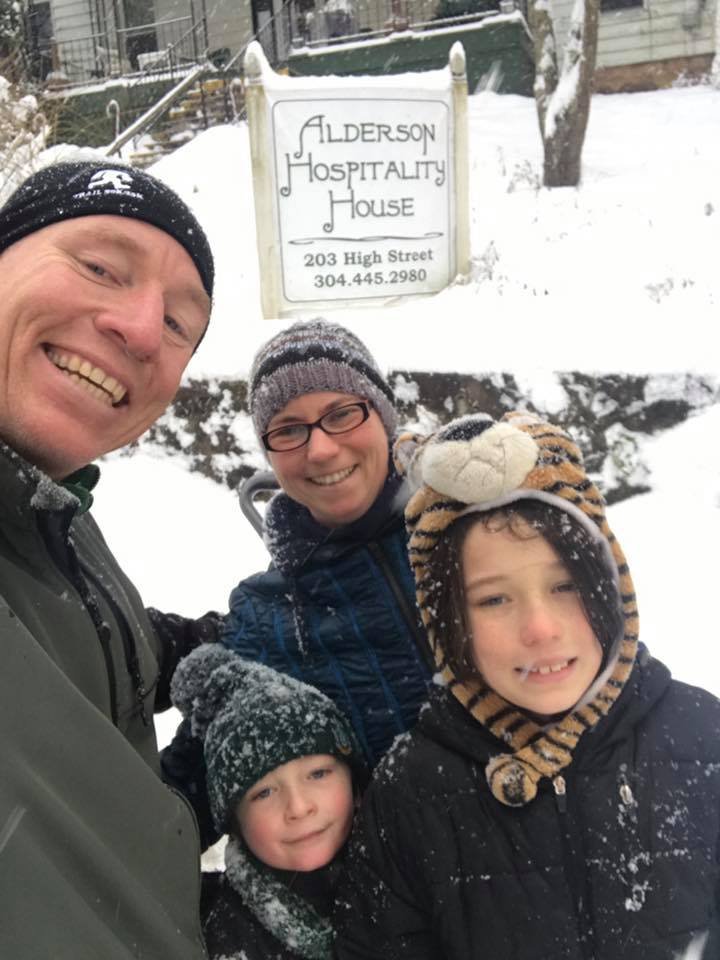A Family of Love and Support at One Federal Prison in WV
Each visit one receives while incarcerated corresponds to that person being 80% less likely to go back to prison. Yet, less than 15% of federal inmates receive one visitor. The Alderson Hospitality House provides love and support for people visiting loved ones who are incarcerated in the Federal Prison Camp (FPC) in Alderson, a federal prison for women that sits along the Greenbrier River in southern West Virginia.
Brian and Kathleen DeRouen and their two sons aged nine and 13 keep the Catholic Worker house of hospitality that is welcome to all: mothers, wives, and daughters saying goodbye to their families before ‘self surrendering’ (going into prison); husbands, partners, and family members visiting their loved ones serving up to 30 year sentences; and those same family and friends picking up loved ones upon release. The DeRouen’s provide rooms, meals, and most critically, love and support to people visiting the incarcerated women in their lives.
FPC is the first federal women’s prison in the United States. Inmates are sent here from all over the country, including US territories. So in addition to having little to no connection to rural WV, there is no hotel next to this prison. “Plus, many people of this incarcerated demographic lack the means to travel, let alone lodge,” Brian notes. But the Alderson House, previously an old school dormitory, accommodates up to 56 guests–busiest around Christmas and holidays–all for free or donation. “It’s a lot of bed making, cleaning, and cooking,” Brian jokes. “And talking, and a lot of listening.”
“During the pandemic we Americans got a tiny glimpse of prison life. Everything we struggled with early on–not leaving the house, not getting to hug parents and family –is what incarceration is like normally. Not always a violent, scary place, but it is lonely and sad.” Brian seeks ways to connect with people who have literally been disconnected and removed from society. “But then during the pandemic prison has been even more sad and lonely; visitation has been essentially canceled since March 2020.”
When it comes to offering support, Brian and Kathleen live their “calling to a gospel-based life” from experience. They did not grow up in a so-called ‘prison pipeline.’ Brian is from suburbia and has a very supportive, middle-class, white family. He went to private schools. But upon studying Theology in college he became active in social justice. He was arrested numerous times trying to affect change, but never served prison time. Then in the mid 2000s, Brian participated in a deliberate, nonviolent action trying to close the what was then named the School of the Americas–a US military school in Georgia that trains Latin American militaries in techniques used to torture and kill thousands, including the Jesuit Martyrs of El Salvador and Saint Archbishop Oscar Romero. “People told us ‘you shouldn’t do this, this will follow you, show up on your record,’” Brian reflects. For this action, he served four months at a for-profit prison in California.
“I never say, ‘I know what you’re going through.’” It can be difficult to peel back Brian’s humility, but he has cultivated undeniable solidarity with incarcerated people over the years. “But it’s accompaniment. I can take someone who is self-surrendering tomorrow into one room, and Kathleen can take their spouse into the next room, and we can simply talk and share: ‘this is what I went through when I went into prison,’ or, ‘when my spouse went into prison,’ all while our kids play with their kids in the playroom,” Brian says. “Or someone can simply go up to a room, and be alone. Such small actions can change the experience of incarceration radically.”
“It can be incredibly overwhelming,” Brian shares of his and his guests’ experience going into and coming out of prison. Calling “as soon as you can” to let your loved one know you’re OK might take up to a week before your commissary, or money, clears and you can make a call. It doesn’t mean something’s wrong, or that you need to worry, “but that is a long, silent week,” Kathleen says. “I remember shaking,” Brian recalls of his own experience, “even though mine was an ‘ideal’ reentry–family support, somewhere to live, work lined up. But I went to the store to get breakfast cereal, was looking at the shelves of options, and… I left without anything.”
“We had no idea that what we were going through with our experience with incarceration was preparing us for what has come, keeping the Alderson House,” the DeRouens recall. But looking at the larger picture, Brian reflects, “What society is saying when we incarcerate someone is ‘we are better off without you.’ We want to give the opposite message, ‘You are part of our family–our mother, wife, daughter, friend - no matter what.’ And we do that through love and support.”
Much of the Alderson Hospitality House’s funding comes from donations from guests and has largely stopped during the pandemic (the DeRouen family spent their first Christmas by themselves in 2020). Donations to the Alderson Hospitality House are greatly appreciated and can be made on their Facebook page, website or by checks written to “Alderson Hospitality House, 203 High St, Alderson, WV 24910.”

